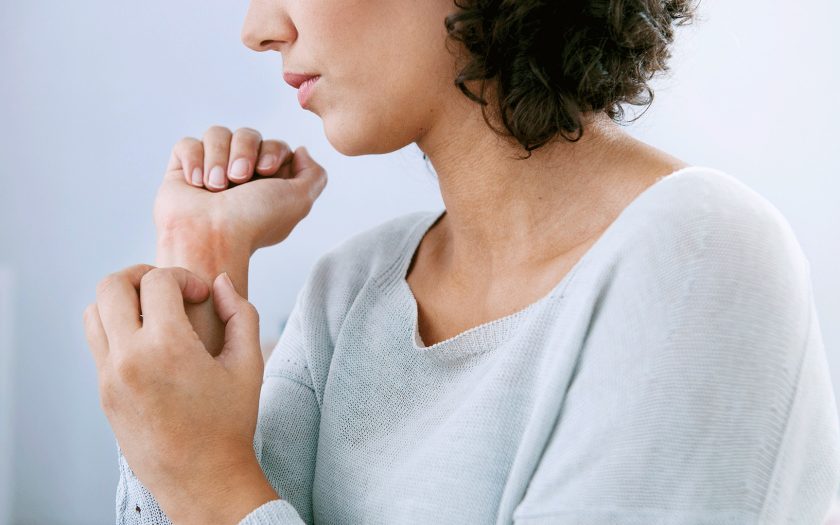-
Prolonged sitting without movement.
Many people spend hours sitting at a computer, in a car, or in front of the TV without considering the impact on their skin’s health. When you stay still for too long, blood circulation slows down, which directly affects the body’s ability to fight inflammation. This is especially important for people with psoriasis, as poor circulation can intensify inflammatory processes in the skin. Evening small actions can have a positive effect — for example, standing up every 30–40 minutes, stretching a bit, walking around the room, or doing light exercises. These don’t take much time, but help activate circulation and reduce the risk of flare-ups. If you work at a computer, you can set reminders on your phone or use a fitness tracker that alerts you when it’s time to move.
-
Smoking or passive inhalation of smoke.
Many people underestimate the effect of cigarettes on the skin, focusing only on the lungs or heart. In reality, tobacco directly influences the course of psoriasis. Nicotine and other toxins in cigarette smoke worsen blood flow, weaken the immune system, and intensify inflammation in the body. For people with psoriasis, this increases the risk of more frequent and prolonged flare-ups — especially when smoking is combined with stress or poor skincare. It’s also important to understand that passive smoking — such as being around people who smoke in the house, on the balcony, or in a car — can also have a harmful effect. Even if you don’t smoke yourself, frequent exposure to smoke still harms your skin. Quitting this harmful habit is one of the simplest and most effective steps toward stabilizing your condition.
-
Perfectionism and self-criticism.
One of the less obvious but very influential habits that can worsen the condition is perfectionism and excessive self-criticism. At first glance, striving for perfection may seem positive, but constantly demanding more from yourself, not allowing mistakes, and feeling dissatisfied with your results creates significant emotional pressure. The body reacts sensitively to psychological tension, and skin flare-ups can appear as a result. A person may not even realize that the flare is not related to diet or skincare, but rather to a constant internal need to be flawless. For example, if you’ve had a rough day at work or didn’t complete everything you planned, and you keep blaming yourself — your body perceives this as a real threat. This triggers the overproduction of stress hormones, which can lead to a psoriasis flare-up. Instead, it’s more helpful to allow yourself to be imperfect and acknowledge your emotions.
-
Self-directed refusal to take medications or use creams when the condition improves.
Many people decide to stop their treatment as soon as their skin lesions improve or disappear, assuming the disease is gone. However, psoriasis is a chronic condition, and even when visible symptoms fade, inflammation can still persist deep in the skin. Suddenly discontinuing prescribed medications without consulting a doctor can cause symptoms to return quickly — often in a more severe form. For example, a cream you were using daily helped keep inflammation under control, and once you stop using it, the skin may start flaking, turning red, and itching again. To avoid this, it is very important to follow the doctor’s recommendations even during periods of significant improvement in the skin condition and continue to take medications (for example Aprezo) and use the necessary creams and ointments (for example Desowen Cream, Diprosone Ointment, Elocon Cream, Tenovate Cream).
-
Sudden climate changes or daily routine shifts without adaptation.
The human body is highly sensitive to environmental changes, especially when it comes to temperature, humidity, or light. And in psoriasis, the skin reacts to such changes even faster and more acutely. For example, if you go on holiday to a country with a completely different climate — say, from cool weather to heat and high humidity — your skin may not have time to adapt. When the body doesn’t have time to adapt, it experiences internal stress, which is one of the strongest triggers for psoriasis flare-ups. To minimize this risk, prepare your body for change in advance. If you’re planning a trip, gradually adjust your sleep schedule, take your usual skincare products with you, stay well-hydrated, and avoid overheating or getting too cold. If your work routine or lifestyle rhythm is changing, try introducing new habits slowly and give yourself time to rest and recover.
-
Frequent use of wet wipes and antiseptics.
At first glance, this may seem like a part of everyday hygiene — especially in cities or while traveling. But for sensitive, inflammation-prone skin, this type of “hygiene” can actually become a source of irritation. Most wet wipes and antiseptic products contain alcohol, fragrances, preservatives, or other chemicals that can dry out the skin, disrupt its protective barrier, and trigger micro-inflammation. For people with psoriasis, this may lead to new flare-ups, redness, cracking, or itching — especially in areas already prone to irritation. For example, if you regularly use antiseptics on your hands or wipe your face with moist towelettes after commuting or eating, those areas may become even more sensitive over time. And even if at first it seems that nothing terrible is happening, over time this can lead to another exacerbation. To avoid this, opt for gentle, alcohol-free, fragrance-free cleansers. It is better to wash your hands rather than wipe them with napkins or antiseptic.

